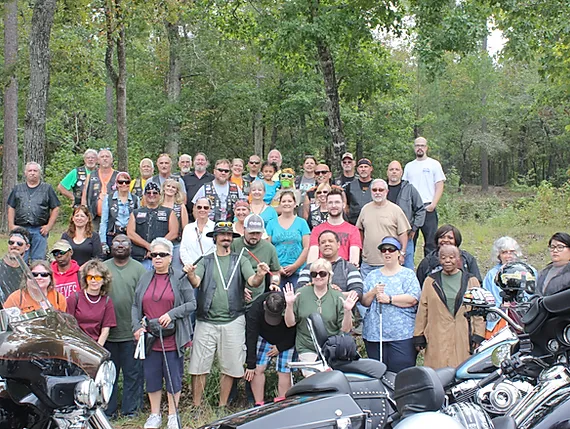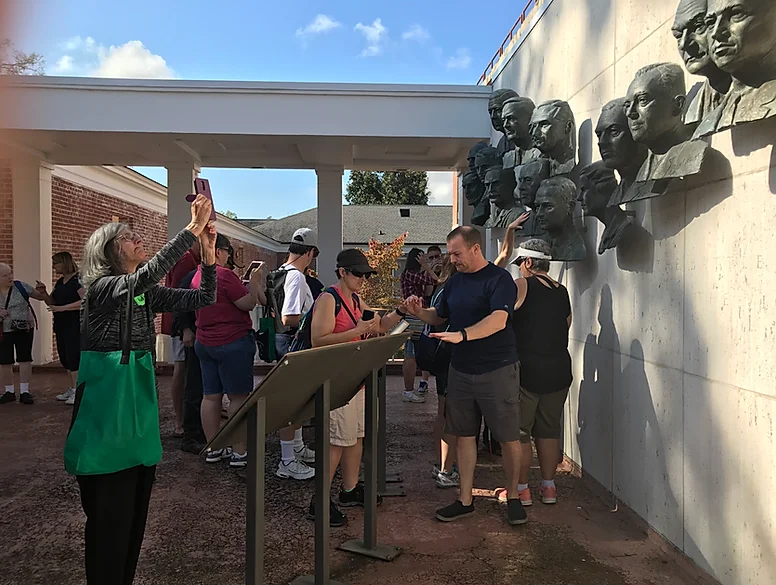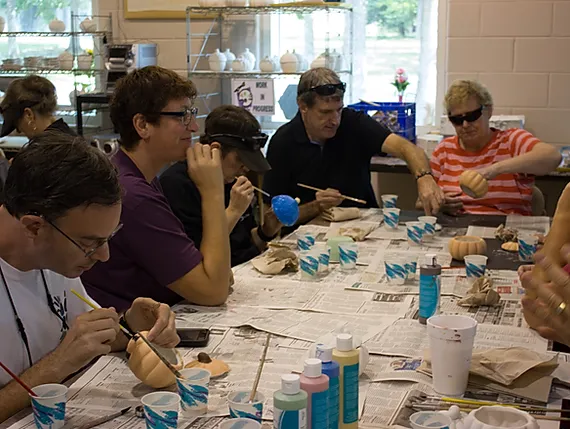Since 1999, DeafBlind Access of the South has offered retreats to provide a sense of togetherness.

Before moving to Georgia, Frank Levine grew up in South Africa. Even though he was deaf, he didn’t allow that to prevent him from enjoying a variety of activities.
However, Levine was unprepared for another life-altering experience after relocating to the U.S. with his wife Rita. He also began losing his vision. Now without both hearing and sight, Levine endured bouts of depression and loneliness. While Rita provided all the comfort and support she could, Frank believed he was the only one who suffered from both hearing and vision loss.
After searching for resources, Rita found the Helen Keller National Center in New York, which provides services for people of all ages with combined hearing and vision loss. Levine went for six months of vocational and rehabilitation training. It was there he discovered there were many people just like him, and they were leading active lives.
Beginning a Dream
Upon returning to Georgia, Levine was armed with a renewed sense of purpose. He wanted others who were suffering from hearing and vision loss to discover the same sense of community he now enjoyed.
Levine began envisioning a camp for DeafBlind adults who could get together and support one another through various activities. He established First Georgia DeafBlind Camp in 1999, and held the initial retreat at a park in Winder.
In 2001, the organization changed its name to DeafBlind Access of the South (DBAS) and began hosting campers from all around the United States. Retreats are held every two years and has grown to 30 participants, some coming from as far as Canada. Adults of all ages, along with Support Service Providers (SSP’s), take part in activities tailored to each individual’s needs based upon their interests.
In 2021, the DBAS Committee voted to merge with Georgia Center for the Deaf and Hard of Hearing (GCDHH). This allowed DBAS to focus more on their mission and less on administrative responsibilities.
Levine retired as the camp’s director in 2015 to take care of Rita, who had become ill. After she passed away, he eventually moved to California and remarried, but remains as the camp’s Honorary Director.
Continuing the Vision
While seeking his replacement, Levine became acquainted with Anne McQuade. Like Levine, she first lost her hearing, then her vision. After the telecommunications company she worked for refused to accommodate her, McQuade began searching for a new opportunity.
Levine was impressed with McQuade’s corporate experience and offered to interview her for the camp director position. McQuade, who lived in New York before moving to Georgia in 1984, remembers the interview as “the toughest of my life.” It was conducted entirely in tactile sign language.
McQuade has continued the vision Levine started, but she remembers having the same feelings of despair and loneliness he did.
“You go through mourning, as if somebody had died. You go through the denial and the bargaining, all those stages of grief that everybody knows about. But I mainly was frustrated. I kept saying, ‘I gotta be able to overcome this’.”
The DBAS camp offers a variety of activities, from swimming, canoeing and zipline to arts and crafts, educational workshops, field trips and even a Bible study.
This year’s camp will be held October 3-8 at Twin Lakes in Rutledge, Georgia. Since 1993, Twin Lakes has partnered with numerous nonprofit organizations to serve thousands of campers each year. This will be DBAS’s first visit to Rutledge. Previous camps were held at Warm Springs, but the site is currently undergoing renovation.
Activities are determined by the DBAS Committee based on a survey taken at the end of each camp. Participants are free to choose which ones they wish to attend. A group of 15 volunteers allows for individualized attention among the 30 campers.
Once they arrive, attendees are given time to check in to their cabins and unpack. Besides the various recreational activities throughout the week, they also get to go shopping, dine out and take field trips to local museums and other attractions. Toward the end of the week, vendors offering services and products for the DeafBlind set up booths for participants to visit.

A Major Boost
Earlier this year, McQuade contacted the Foreseeable Future Foundation and applied for a grant. Campers pay $400 to attend, but DBAS covers room and board and other expenses for the volunteers. A Foreseeable Future grant would help defray most of those costs, as well as for transportation.
McQuade was overjoyed when she was notified her application was accepted.
“I was blown away, I was in shock. I had been looking for grants forever and have been totally unsuccessful. We are going to be able to do so many things with that.”
Feedback from campers has been overwhelmingly positive. The biggest question McQuade gets asked is why camps are only held every two years. The reason, she explains, is money.
“It takes two years to raise enough funding. It’s enormously expensive.”
That’s why foundations like Foreseeable Future are so important in continuing the vision Frank Levine began nearly 25 years ago: providing the DeafBlind community a sense of belonging, knowing they are not the lone survivor on a deserted island.
“This whole event is all about reducing isolation among this population. We have people on the waiting list. That’s how much desire there is to get together. I wish we could do more.”

